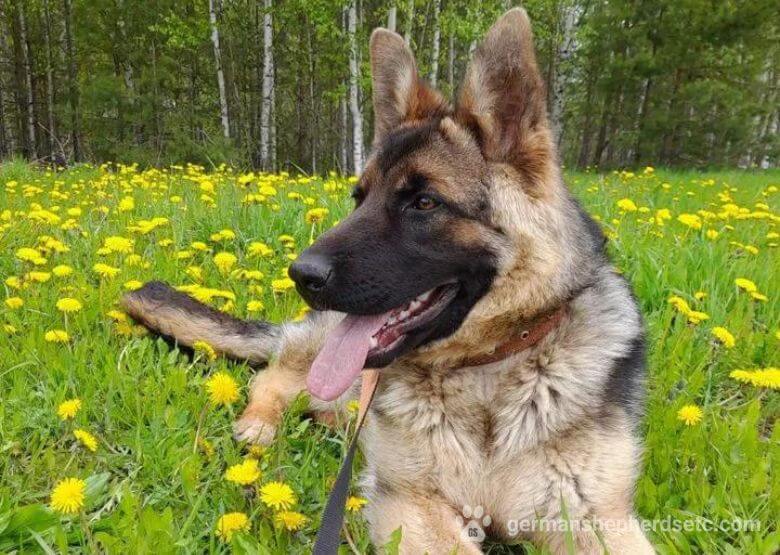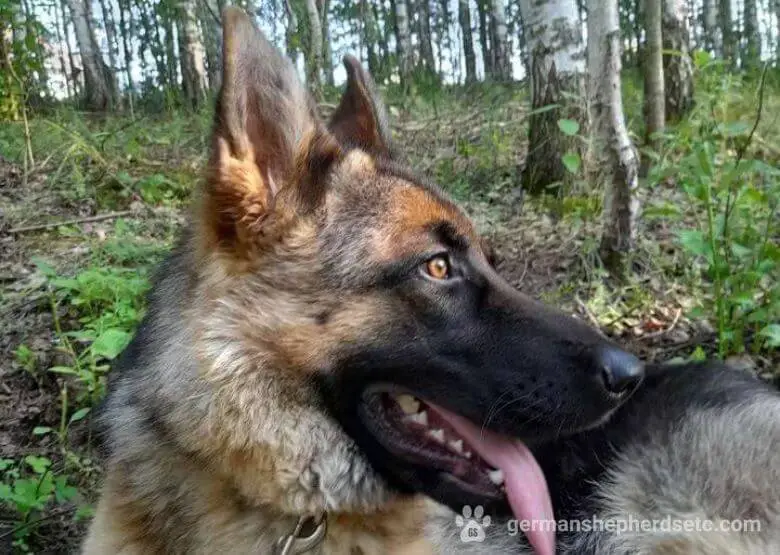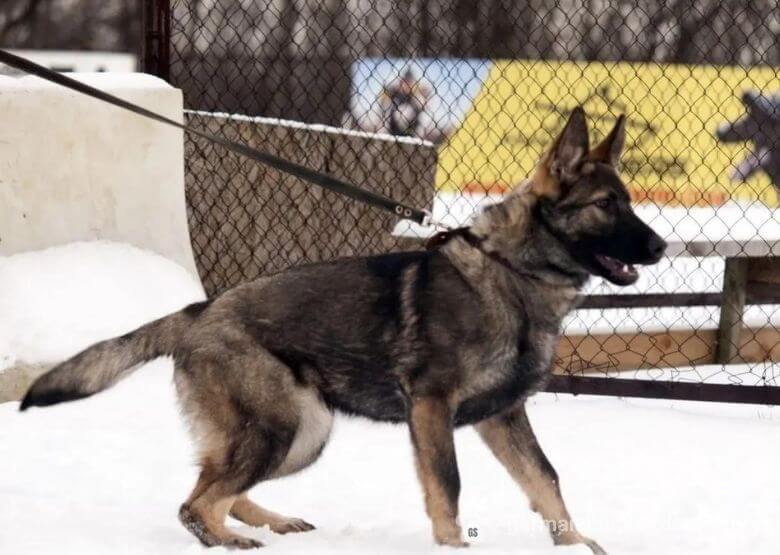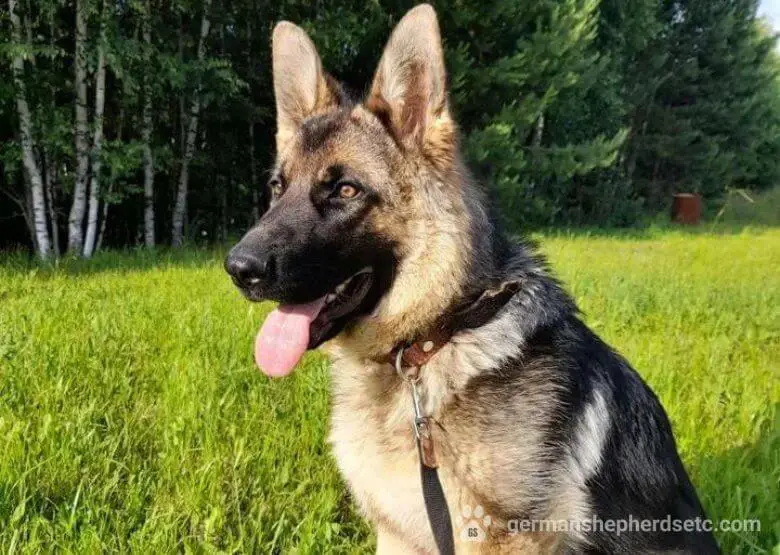Table of Contents
When your 1 year old German Shepherd looks or behaves differently from the common descriptions you may find on the Net, you start worrying. You want to go to the vet immediately and spend a lot of time asking questions. Most often, your veterinarian does not find anything bad, but in a while, the situation repeats.
Even if you want your pup to grow as healthy and happy as possible, you need to relax because many things can depend on your dog’s heritage, its parents, and breeder, so there may be some differences from standards. However, there are some vital things that you need to know about your pet to feel calm and relaxed.
Your doggy’s first birthday is a great event for both of you. Your pup is almost full-sized now, but it needs some more time to mature and develop emotionally. Reinforcing good habits and giving proper care can help much.
We have prepared a set of helpful tips to help you ensure that everything is OK, no matter whether it was born in your household or you adopted it later.
Size & Appearance
Your 1 year old GSD has been growing all this time rapidly. Now, it is about its adult size and weight. You should know that there are differences between male and female dogs. Your boy Shepherd weighs 71-79 lbs (32-36 kg), and the girl doggy can weigh 60-64 lbs (27-29 kg). Some dogs can be lighter or heavier at this age, but you need to measure their weight just once a week to ensure that they are not overweight or underweight because many health problems may start here.
However, if you do weigh your pup regularly, you may notice that gaining weight has already slowed down. Female Shepherds almost reach their full adult weight while males continue growing muscles. Even if you notice the slow-down in your male doggy, it is a pause, not a stop. They continue to become heavier until they are two.
The height of your pup at one year of age also varies between males and females. The boy is usually 22-24 inches (56-61 cm) tall, while the girl is shorter at its withers – 20-22 inches (51-56 cm).
Your pup’s ears have to stand erect before it is five months old. However, in some dogs, the ears may stand upright at the age of eight months or even later. However, at one year, floppy ears in your dog may mean either damage to the cartilage and its poor development or doubtful purity of the breed. Anyway, you have to consult your vet about what to do next.
Your German Shepherd’s coat is double-layered and entirely adult now. However, it’s now when your pup starts shedding badly. Hormonal changes and seasonal reasons may cause immense loss of fur. That is why these dogs are often called German Shedders. You can prevent such extensive shedding by regular brushing, usually twice or three times per week and every day during the “high” seasons.
Your pup had stopped teething by the time it reached 6 months. However, you must not be surprised if it lasts until one year. Every doggy is different, and their dental development stages may vary. In general, at the age of one year, you may expect a total of 42 white, shiny, and sharp adult teeth in your dog.

Activity & Behavior (Sleep, Walk, Exercises)
You may wonder what to expect from your German Shepherd 1 year old behavior. In fact, it can vary for different animals, too. Even if you managed to establish close bonds with your doggy by this time, you may occasionally encounter misbehavior, aggression, and testing its independence and your leadership.
Therefore, you don’t need to get worried if your pet’s behavior is sometimes destructive. It only means that you need to engage your four-pawed friend as much as possible and continue its basic training.
Be aware of possible casts of aggression toward strangers. It can happen when your pup is bored, excited, or poorly socialized. Another issue is chewing up the furniture and clothes or biting and nipping. Even if your doggy is not teething now anymore, there may be such problems. Your Shepherd tries to attract your attention inappropriately, so you need to be patient and stop such attempts as soon as you see them. Your dog must know that it is wrong to behave like that, so you can say “off” and pat it on the nuzzle. Don’t shout or beat your doggy because it can make the situation worse. If you feel that your GS will continue with such behavior, contact an experienced dog trainer.
However, the trend for your puppy is to calm down around the age of one year. So, you will see grown-up behavior very soon. You can now follow these tips to deal with your German Shepherd’s behavior:
- All individual dogs are different, and your pup cannot behave exactly in the same way as your friend’s one.
- The aim of all German Shepherds is to herd and guard, and the guardian breeds reach full maturity later than other breeds. Shepherds are working dogs, so it takes more time for them to set close social bonds with their counterparts and pack members because they are aimed at defending flocks from large predators.
- If you have a boy, it will mature more slowly than a girl, so don’t expect it to get settled at once.
- Your pup may not seem too confident. Confidence develops between 1 and 3 years of age. So, you won’t see an abrupt decline in jumpy reactions and nervous responses immediately.
- Nurturing is equally important. Even if your doggy has individual characteristics relevant to its breed and age, such as being friendly, reserved, stubborn or cooperative, shy or bold, you can develop its personality and build up the desired behavioral patterns with other people, changing places, or animals around.
Make your training and cooperation rewarding. The opportunities for your doggy to become a happy and loyal companion are unlimited. Don’t miss them.
Other behavioral patterns include exercising, sleeping, and walking. Your German Shepherd is very strong and energetic at this age, so it needs at least two hours of exercise per day. They can include an hour of walking (5 minutes per every month of age) and off-lead exercises in a safe area. Your pup may get bored very fast, so play and train it in turn to make a variety.
Your pup does not require as much sleeping time as before because it is curious, active, and investigating. The number of hours it may need per day reduces to 15-18 instead of 18-20 as before. However, even if your doggy sleeps more than 18 hours, it can be a norm because the sleeping patterns and needs can differ between dogs, and other factors may influence sleep time.
Health & Care
Your 1 year old German Shepherd is growing healthily. However, you need a veterinarian check-up just once a year to ensure everything is going on properly. You must also watch out for unusual signs that may indicate health problems. They include weight loss, personality changes, vomiting, diarrhea, loss of appetite, sneezing and coughing, gagging, excessive urination, thirst, itchy skin, urination difficulties, swollen gums, runny nose and eyes, spelling disorders, and anything that your doggy unexpectedly starts displaying. Your pet’s problems can be severe or minor, but you will never know until the visit to your vet.

Let’s assume that your German Shepherd is absolutely healthy. Functional disorders can appear later, at 5 or 6 years old. However, you need to know that your pup at this age can experience ear infection, kennel cough, Lyme disease, heartworm, influenza, and fleas or ticks invasions. Some of these issues can be severe and even life-threatening.
Regular checkups can prevent most health disorders. Apply heartworm treats and collars against ticks and fleas if your vet prescribed it. This time also requires booster shots of the main vaccines, such as rabies, distemper, and parvovirus. Your vet may tell you about the specific law regulations against rabies in your area that you need to observe. Your vet can also recommend titer testing to understand whether your dog has acquired enough immunity from puppy vaccinations.
You may also need to renew the pet insurance for cases when your dog needs expensive treatment or faces life-threatening conditions. For example, you must be aware of gastric dilatation volvulus or bloat threat. In this event, a German Shepherd can die if it does not receive emergency surgery that may cost up to $5,000. Your pup may also suffer from hip dysplasia later; this insurance can cover medical symptom management. Your insurance policy should also relate to public liability if your doggy bites somebody or causes damage to their belongings.
The age of one year is also crucial for deciding to spay or neuter your dog. It’s up to you to decide, of course, but veterinarians strongly recommend it for the health benefits of your pet if you are not going to breed puppies.
However, consider all pros and cons of this procedure at this age. Since your pup continues growing, any procedures that can cause hormonal changes can lead to joint disorders. So, many vets recommend male neutering after the dog becomes completely mature. Anyway, talk to experts and get advice from them.
As for females, your vet can recommend spaying your girl after its first heat cycle without letting it enter the next one.
Feeding
Your 1 year old GSD is a strong and highly energetic animal. It needs an appropriate diet to grow and stay healthy. Talk to your vet and choose the best variant of adult food for your doggy. You have to be careful about your pup’s weight. Overfeeding can lead to health problems, so try to schedule meals properly.
Your dog needs feeding two or three times per day. Don’t take a break between meals for more than 12 hours, or your pet will have digestion problems. The amount of food should correspond to your pet’s weight, energy, activity, and age. The common amount per day is 5-8 cups. You have to spread it equally between the meals. To spread the meals in time, feed your pup at 10 a.m. and at 8 p.m.
Feeding can provide a new milestone at this age. It is a transition to adult food. While your German Shepherd is a puppy, it needs high-caloric food to grow. Though now, it does not grow so quickly and intensively. Males have already achieved 90% of their adult weight, and females are almost grown-up. It means they need fewer calories than puppies to avoid overweighting. However, if your pup is still growing too rapidly, you need to reduce the amount of food to avoid joint problems.
The transition to a new diet can be gradual if possible. It can be implemented for several days. Start with giving your dog 1 part of the new food and 3 parts of the old food for several days. Then, transit to equal parts of old and new food in the next two days. At last, your doggy can eat 1 part of the old and 3 parts of the new food without any digestion problems. Now, you can end up rejecting the old food altogether.
When you decide how much food to offer your doggy, consider its levels of physical activity. Less active pups should eat less to avoid overweighting.
Provide your doggy with enough water. Generally, a young German Shepherd needs 0.5-1 ounce (14-28 mg) of water per pound of body weight per day. So, if your pup weighs about 70 pounds (32 kg), it will need 60-70 ounces (1.7-1.9 liters) of water per day.
Training

Your 1 year old German Shepherd is still emotionally unstable and immature, so you have to continue training to promote proper behavior and reduce nervousness. You must focus on two types of training now – obedience training and building up working habits.
When you continue obedience training, reinforce rewarding behavior by treating your pup positively. Remember that your Shepherd can get bored and restless without engagement. Involve training for agility, joring, canicross, scent work, and herding to boost your doggy’s confidence and a sense of purpose.
When your pup displays bad behavioral patterns, use distractions and redirect its attention to something more desirable. While training, reward its positive behavior with praise, patting, and treats.
Never overdo training and make calming pauses. Ignore demanding behavior, such as pawing, jumping, or barking. Do not apply physical punishment, and never yell at your pup. If your dog has had an accident, never rub its nose in it.
Your encouragement should be continuous but do not laugh or giggle when your doggy does something inappropriate. Stop the unwanted behavior immediately, but never punish your pet after the fact.
Remember that teaching your German Shepherd new tricks and advanced commands is never too late. Of course, it should have acquired the simplest skills and obedience habits by this time. Though you may even find it easier to work with your doggy at this age because it has a longer attention span and more self-control now. In fact, dogs can learn something new at any age. That is why it is important to continue training your pup on its way to maturity.
FAQ
How much exercise does a 1 year old German Shepherd need?
Your doggy needs a lot of exercise at this age – not less than two hours per day. Walking can take about one hour (5 minutes for every month of its life). You may divide this time into two walking sessions during the day. Other exercises must include playing and training. Mental stimulation and socialization are also important parts of exercising.
How much should a 1 year old German Shepherd eat?
Your dog is still growing, but this process slows down. So, it’s time to transfer it to adult food. The overall amount of food your pet needs per day is 5-7 cups divided between 2 or 3 meals. Never feed your dog once a day – it may have digestion problems.
Final Thoughts
Continue training your 1 year old GSD to let it grow up healthy and strong. It has to be funny, alert, and loyal. However, remember that it is still a puppy, and no specific time is established for all dogs’ maturity. It is individual. So, follow the tips presented in this article and recommendations from your vet and dog trainer.
This age is not the easiest for a dog owner. You have to be patient and consistent. You will observe some rises and falls in your pup’s behavior and development. However, if you are persistent, you will soon get an intelligent, obedient, and loyal companion.

